
It's estimated that up to 1 in every 10 people in the UK has some degree of dyslexia. Dyslexia is a common learning difficulty, which primarily affects the skills involved in accurate and fluent word reading and spelling. However, a child or young person can be affected by dyslexia in many ways. For instance, a learner may experience difficulties in writing (Dysgraphia) and maths (Dyscalculia), as a poor working memory can affect sequencing and mental calculation. They may find it difficult to quickly process verbal instructions or appear to be disorganised and lacking in concentration. It may also be harder for them to control their bodily movements (Dyspraxia). Dyslexia can be a confusing and disorientating condition that can negatively impact the learner’s self-esteem and confidence in learning.
This course aims to develop the knowledge, skills and practice of all education professionals working with children and young people (CYP) with dyslexia. You will learn how to assess the needs of a learner and go on to develop a support plan consisting of SMART goals and interventions, which you will implement and later review to determine how well it has met the learner’s specific developmental needs.
The course content relates to learners in compulsory education (4-18 years) and responds to the information needs of the whole community. Parents and carers benefit from raised awareness of their child’s needs. Advisory teachers, therapists and educational psychologists gain access to evidence-based CPD resources that can be used to strengthen capacity in their local authority and schools. Schools can use this course to train individuals or groups of teachers and teaching support staff as part of a school’s improvement plan or a whole-school initiative. NQTs/RQTs also build a secure knowledge of the graduated approach at the start of their career.
Our courses are structured into four sections. Click on the section headings to reveal page titles and some example content.
Learn about the main characteristics, the role of working memory, the range of difficulties that learners may experience and the impact on other areas of functioning.
- Section objectives
- What is dyslexia?
-
Characteristics of dyslexia
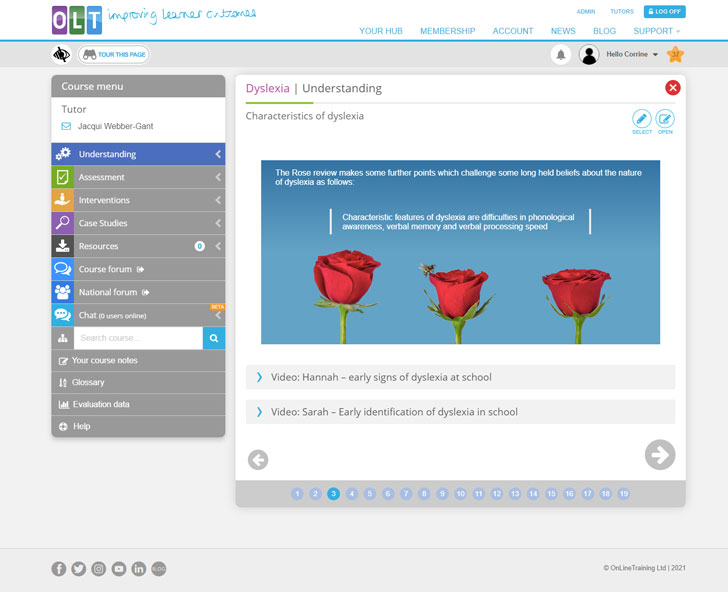
Screenshot from Understanding page 3 - Characteristic features: phonological awareness
- Characteristic features: verbal memory
- Characteristic features: verbal processing speed
-
Working memory and dyslexia
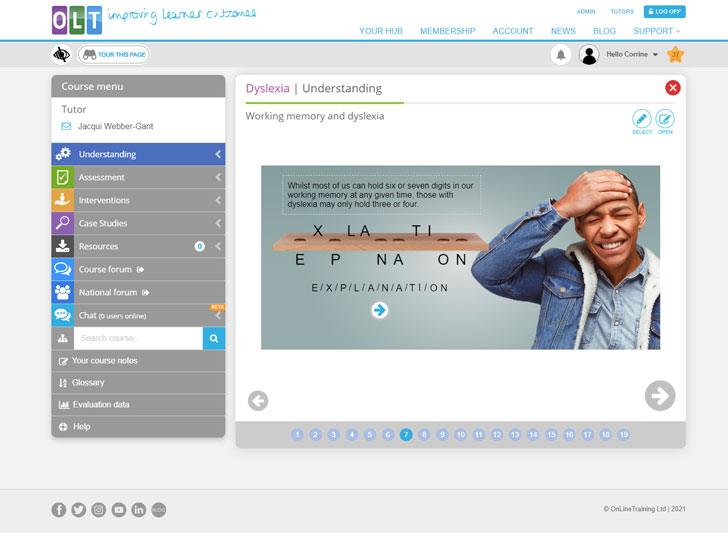
Screenshot from Understanding page 7 - Dyslexia and intelligence
- The Simple View of Reading
- Visual stress
- Dyslexia and other difficulties
- Other reasons for poor reading
- What causes dyslexia?
- The incidence of dyslexia
- The politics of dyslexia
- Perspectives on dyslexia (Catherine Brogan video)
- End of section quiz
- Section summary
Learn how to assess individual needs and carry out informal assessments of the main areas of potential difficulty.
- Section objectives and your learner profile
- What is assessment?
- Screening for dyslexia
- A graduated approach to assessment
- Monitoring progress
-
Skills assessment
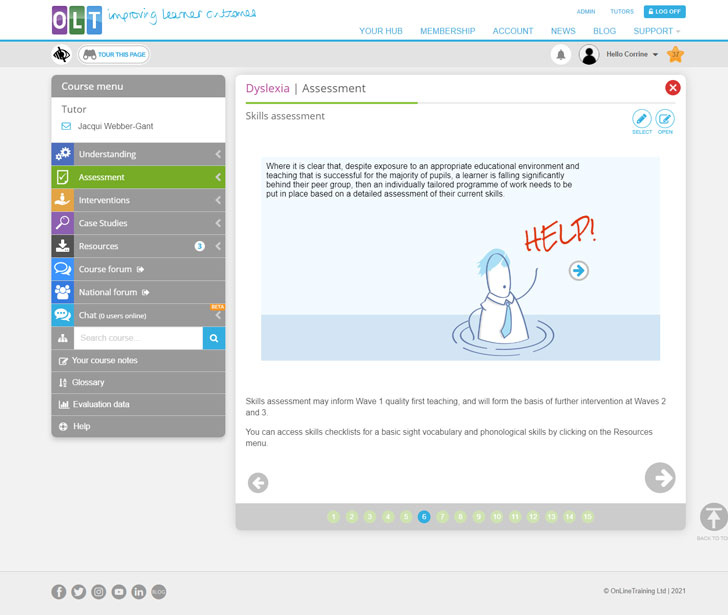
Screenshot from Assessment page 6 - Co-occurring difficulties
- Comprehensive assessment
-
Carrying out your own assessment
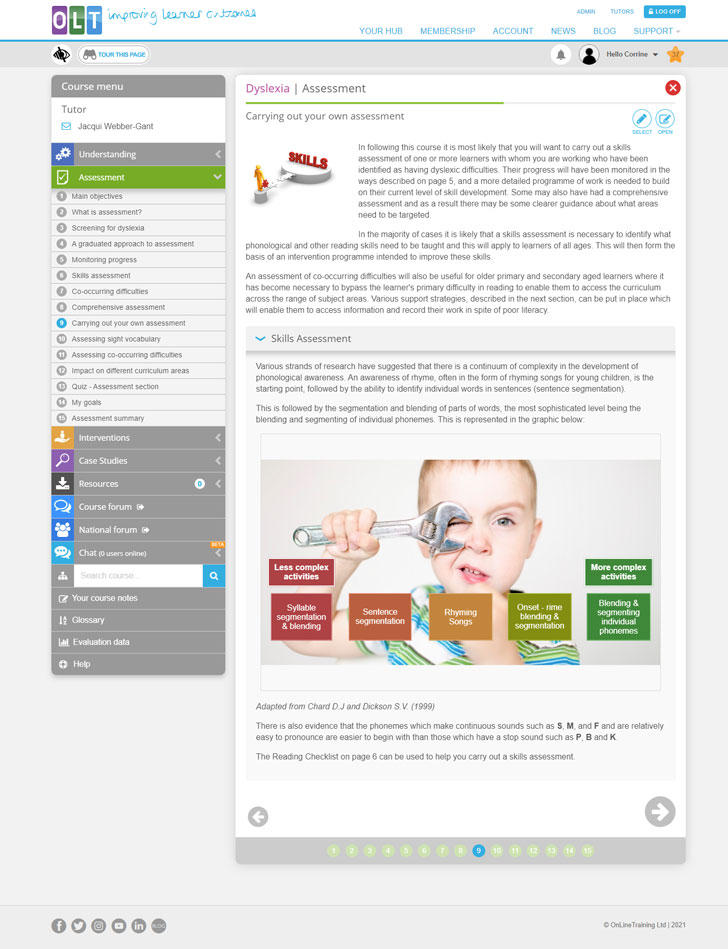
Screenshot from Assessment page 9 - First reading skills
- Impact on different curriculum areas
- End of section quiz
- Course assignment: Your Learner’s three SMART Goals
- Section summary
Discover a range of strategies to help learners with dyslexia and literacy difficulties.
- Section objectives
- Issues in intervention
- Principles of intervention in reading founded in research
-
Multisensory teaching
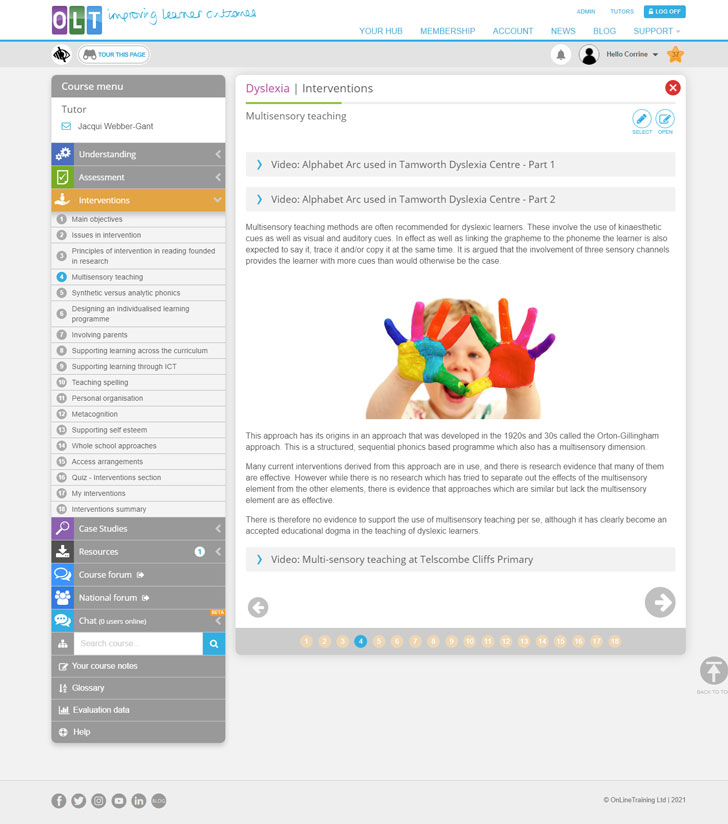
Screenshot from Interventions page 4 - Synthetic versus analytic phonics
- Designing and individualised learning programme
- Involving parents
- Supporting learning across the curriculum
- Supporting learning through ICT
- Teaching spelling
- Personal organisation
- Metacognition
-
Supporting self esteem
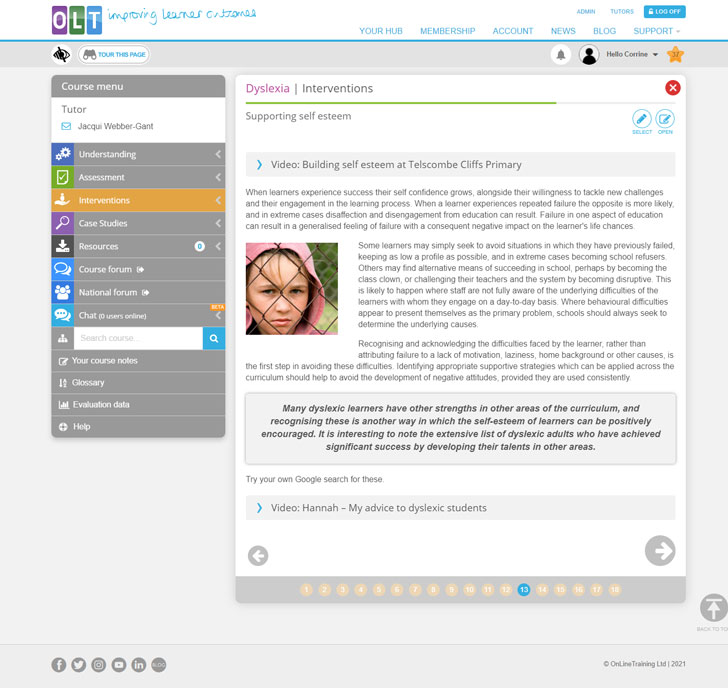
Screenshot from Interventions page 13 - Whole school approaches
- Access arrangements
- End of section quiz
- Course assignment: Your learner’s interventions
- Section summary
Real examples illustrating how the needs of the individual were supported and the results.
- Case study: The dyslexia strategy in Staffordshire
- Case study: Three Year 4 pupils at Telscombe Cliffs Primary School (East Sussex)
- Case study: Harrison (Burton Centre)
- Case study: Tamworth Dyslexia Centre
- Case study: Belgrave High School – Staffordshire
- Case study: Meet Hannah and Sarah
Senior Leader
Teaching Assistant
Teaching Assistant
Other Position
Senior Leader
Teaching Assistant
Senior Leader
Teaching Assistant
Other Position
Qualified Teacher
Teaching Assistant
Qualified Teacher
Teaching Assistant
Teaching Assistant
Teaching Assistant
Senior Leader
Teaching Assistant
Teaching Assistant
Qualified Teacher
Teaching Assistant
Teaching Assistant
Qualified Teacher
Teaching Assistant
Course learning outcomes
On successful completion of the course, you will be able to:
- describe the relationship between phonological awareness and reading ability
- explain the role that working memory has in learning to read, write and spell
- examine the purpose and process of individual education assessments
- apply a graduated approach to assessment using a universal, targeted or intensive staged process
- use checklists to assess reading, comprehension, decoding and phonological awareness
- identify co-occurring difficulties
- provide strategies to teach decoding, spelling, comprehension, phonological awareness and reading fluency
- systematically monitor progress in response to intervention, and plan next steps
- evaluate how assistive technology can support student progress
- work in partnership with parents to create an action plan to practice and improve literacy skills
- create a support plan for a pupil/group of pupils in your school

